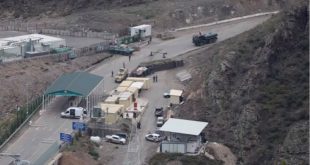raq and Iran have inked an agreement to address the challenge of dust control jointly.
The accord, signed on Tuesday evening, was formalized following a meeting held in the Iraqi capital, during which the head of the Iranian Department of Environment, Ali Mohammad Tahmasbi, conferred with Abdul Hussein Obaid, the Technical Agent at Iraq’s Ministry of Agriculture.
Over the next two months, the two nations plan to launch four pilot projects in Iraqi provinces: Dhi Qar, Muthanna, Wasit, and Maysan. Simultaneously, two pilot endeavors will commence in Iran’s Ilam and Khuzestan provinces.
Central to this cooperative venture is the joint commitment to combat desertification, alleviate the impacts of climate change, ensure food security, and effectively manage and counteract dust storms.
At the meeting, Obaid underscored the significance of tangible actions in addressing the region’s dust challenges. He emphasized that a collective effort involving West Asian countries, including Iraq, Kuwait, and Iran, is imperative to resolve dust-related issues effectively.
Obaid also highlighted that the Iraqi Ministry of Agriculture is actively seeking funding to address fine dust particles and identify dust centers in provinces bordering Iran and Kuwait.
Tahmasbi stressed the need for direct cooperation between the two countries to tackle the problem. He affirmed Iran’s readiness to address desertification cases along the border areas.
The World Bank, in a report issued at the end of 2022, highlighted Iraq’s urgent climate predicament, urging the nation to adopt a more environmentally conscious development model. The report outlined the need for Iraq to diversify its economy and reduce its carbon dependency to address the climate challenge.
According to the report, Iraq’s quest for sustainable development will require an estimated $233 billion in investments by 2040, equivalent to approximately 6% of its annual GDP. Notably, Iraq ranks among the United Nations’ five most climate-vulnerable nations, a vulnerability further compounded by decades of conflict and heavy reliance on oil revenues, accounting for about 90% of the nation’s income.
 Alghadeer TV Alghadeer TV
Alghadeer TV Alghadeer TV
